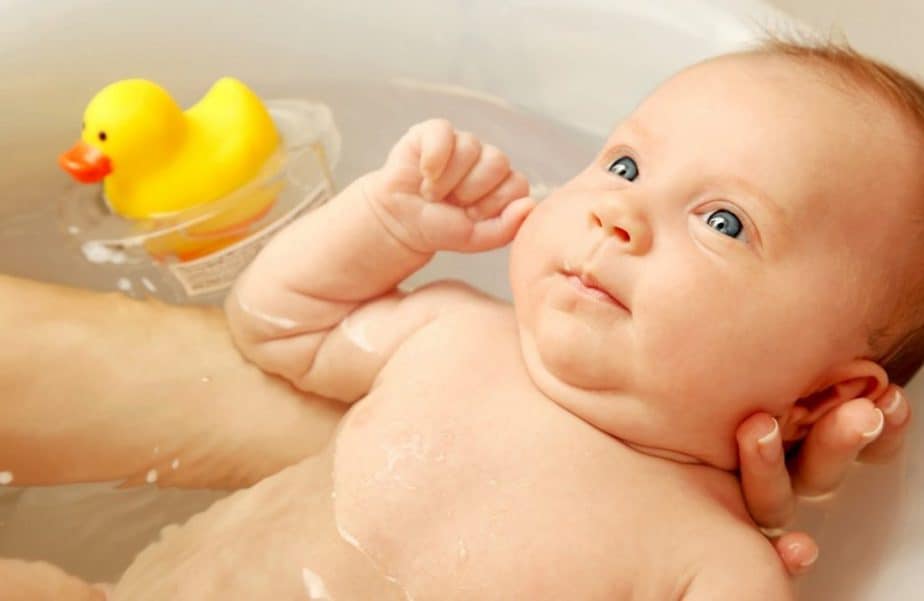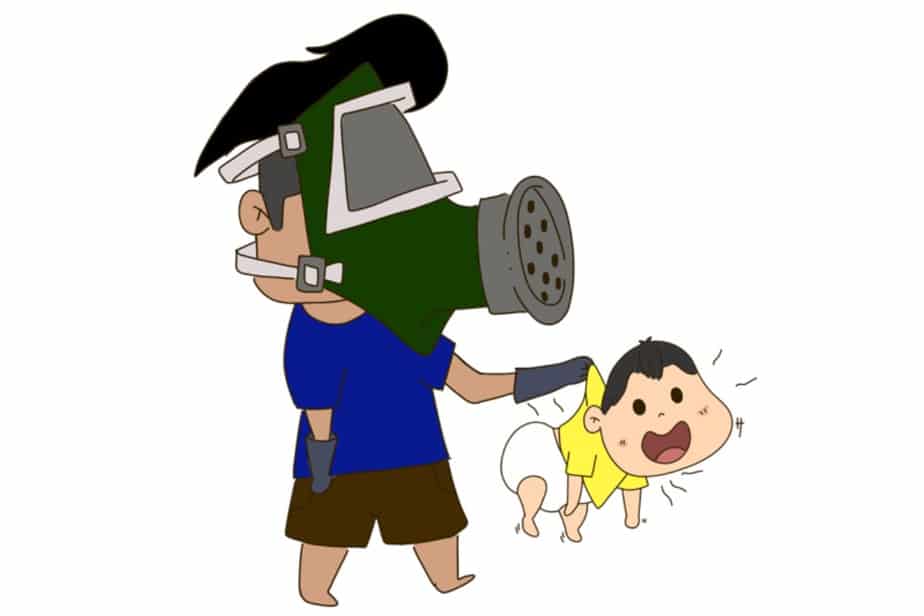Have you ever carried your baby and wondered, where is that smell coming from? I bathe him often and keep him clean, but why does he smell bad? Why doesn’t he smell good like other babies? Well, you’re not alone here. I faced the same problem. Fortunately, it just requires a simple fix in most cases, so don’t be surprised at the answer. I’ll cover everything from the most common to uncommon causes.
The reason babies smell bad is that drool, food, sweat, or other substance are trapped beneath their neck folds. Dirt and sweat can also accumulate beneath the armpits, stomach, arms, legs, private parts, and other areas where their skin overlaps.
Babies have more fats, they are short, and they have flappy skin. It is easy for dirt to get trapped in those areas unnoticed, especially the neck. You need to be thorough when cleaning these areas.

The smell is the first sign that you need to take action because your baby can begin to develop rashes and even eczema if left alone. Now that we know let’s look at all angles to rid our baby of that nasty smell!
Check if your baby’s neck and skin are clean
The neck is the most common area that is causing the smell. Put your nose against your baby’s neck and check if the smell is coming from there. Chances are it is.
Lift your baby’s neck up and thoroughly pry the neck folds open. You may notice some musty white substances. If you find it, you need to clean it as that is dirty stuff. You may use a clean wet cloth to clean it, but taking care while cleaning because if the dirt has been there for some time, your baby may even bleed a little.
It’s also common for the affected area to be red and tender, so avoid using the cloth to rub if your baby has these conditions.
We find that the best way to clean our baby’s neck is to put baby soap on our hands and slide it in between the neck folds. The soap acts as an excellent lubricant and allows us to reach deep into the folds. This method also causes the baby’s least friction and irritation but thoroughly cleans off the soap afterward.
Avoid scented or fragranced material as it tends to irritate the skin and cause dryness.
You can also attempt to clean the neck by placing your baby on his tummy, babies above 2 months old will begin to lift their heads during tummy time, and more spaces of his neck will be made available for you to clean. I’ve written an article about baby development milestones here.
We trained our one-year-old to lift his neck when we say “neck up.” Keep repeating it and lift his neck; he will soon learn to lift it when he hears the “neck up” word. Please pay attention to the stomach and chest areas, using the methods mentioned above to clean them thoroughly. Next is the area below the tummy and their private parts. Babies and toddlers, especially the chubby ones, will require more attention in these areas.
How To Keep The Neck Clean & Dry
Now that we’ve cleaned the neck, we need to keep it clean and dry. The easiest way is to use a bib; it can help prevent drool and vomit from flowing to the neck. I prefer to use cotton bibs as they are more cooling. Do not use the bib when your baby is sleeping. It may cause suffocation if it accidentally covers her face.
If you’re staying in humid places, try to keep your baby cool as sweat can easily accumulate in the neck folds. Cleaning the neck and affected areas a few times a day is not excessive. I encourage it. When drying the raw areas, do not rub with the towel. Tap it until it’s dry.
Try not to use powders to keep their neck dry; if they accidentally inhale the powder, it can cause damage to their lungs and may also cause breathing problems [source].
If you use lotions, you need to ensure it’s wiped off later, or it will accumulate and become a problem later. Be aware that most lotions contain fragrances, and fragranced stuff can cause irritation and dryness to the skin.
Odour Caused By Body Conditions
Sadly, there may be other causes of why your precious little one has unpleasant smells. Before you continue reading, please know that the information posted here is just for your information and is not intended to give you more stress or worries. We hope that with this information, you can bring your baby to her pediatrician for a checkup.
Most of the time, the pediatrician has a solution, and it turns out that it isn’t a disorder at all! Now, let’s look at some of the potential disorders.
The first possible disorder is Cradle Cap [source]. In serious cases, your baby may smell like yeast. This condition is common for babies three months old or below. Your baby’s scalp, forehead, ears, eyebrows, or eyelids may have crusty or oily scaly patches.
Use baby shampoos or cradle cap shampoos to clean the affected areas regularly, then use a cradle cap brush to remove the flakes and scales gently. You can get a cradle cap brush from Amazon here.
You may also use olive oil or coconut oil to gently massage before brushing the scales off, but make sure to wash off the oil after that to avoid clogging the oil glands. It may take a few attempts to clear the scales fully, so don’t rush to clean it off in one day. If your baby is already smelling like yeast, bring her to a pediatrician for a checkup as it can be a yeast infection.
The second possible disorder is Trimethylaminuria (fish odor syndrome) [source], where your baby (or toddler) smells like fish. This is a rare disorder, and the symptom is the baby is smelling like fish. In mild cases, try avoiding the following: cow’s milk, eggs, beans, peanuts, seafood, and shellfish. If this doesn’t help, go to the pediatrician for help.
The third possible disorder is Phenylketonuria (PKU) [source], where your baby may have an unpleasant musty or mousy body odor. If you’re from the United States, the hospital you gave birth in has probably checked and notified you if your child is diagnosed with it. This disorder is more serious as it may cause mental retardation. If treated within days of being born, mental retardation can be prevented.
Related Questions
How to treat my baby’s bad breath? A lack of oral hygiene most likely causes bad breath. You should start brushing her gums and tongue on her first day of life. Some brush their baby’s mouth after every meal, and we think it’s a good practice, but we personally just do it once a day. Before she has any teeth, just use a wet cloth, dip it in water (we use boiled water, but make sure it’s not hot) and rub it against all her gums and tongue. When her teeth start to grow, start using baby toothbrushes. Keep this up to keep the bad breaths away! Here’s an Amazon link to get a baby toothbrush.
How to keep my baby smelling fresh? If your baby is less than 3 months old, it’s fine to bathe her 2-3 times a week since she doesn’t sweat like us, but because she drools and does come into contact with us, it’s good to wipe down your baby once a day. Check the video below on how to wipe down your baby. If your baby drools a lot, you need to change her bib often. Change it when it’s already wet or if she vomits. It’s common to change anywhere between 3 to 12 times a day. Don’t forget about diapers; immediately change after she poops, or 4-5 times a day.

